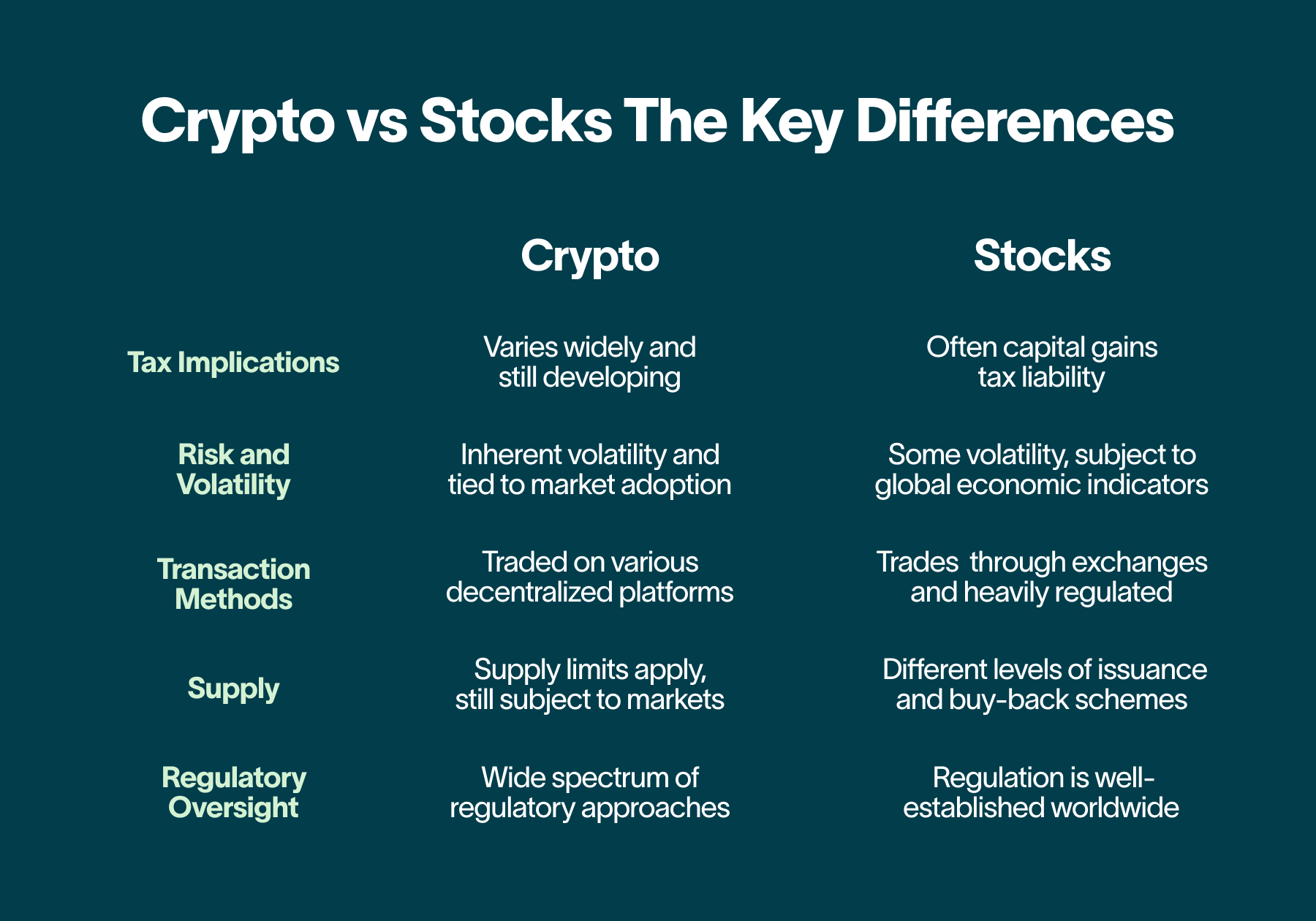Crypto vs Stocks: Which is better in 2025

Ledn has over $10 billion in loan originations since 2018 and counting!

Investing in both the stock and crypto markets can seem overwhelming as they’re both complex in their own unique ways.
This guide will help you understand the key differences, benefits, and drawbacks of each investment type, enabling you to make decisions that align with your financial goals.
Brief Overview of Crypto And Stocks as Investment Assets
Crypto and stocks represent two fundamentally different investment avenues.
Cryptocurrencies are digital assets secured by cryptographic methods, making them non-physical and easy to trace. They operate on decentralized blockchain networks. They’re a relatively new concept, launching when Bitcoin came on the scene back in 2009.
Stocks, on the other hand, have existed for as early as the 1600s– a stark contrast to crypto’s brief lifespan. They’re not a currency, but rather they represent ownership of a portion of a company, with shareholders sometimes entitled to some of the company's profits and assets.
Crypto vs Stocks: Pros and Cons
Crypto:
Pros:
- High potential for returns
- Decentralization makes them more open to the world
- Backed by an innovative technology giving rise to new financial tools
Cons:
- Extremely volatile
- Regulatory uncertainty worldwide
- Prone to hacks and bad actors
Stocks:
Pros:
- Proven track record for growth
- Dividends can open a new revenue stream
- Regulatory protections worldwide
Cons:
- Market volatility still exists (just to a lesser extent to crypto)
- Stock markets are more sensitive to recessions
- Potential for total loss if investing in a single company
Stocks Vs Crypto: Historical Performance
Historically, stocks have offered long-term growth, with the S&P 500 Index averaging an annual return of about 10% before inflation.
Cryptocurrencies, while newer, have seen periods of explosive growth and significant volatility. Bitcoin, for instance, has experienced both rapid increases in value and substantial declines within short periods.
Crypto vs. Stocks: Which Investment Won the Last Decade?
To really see how these asset classes have performed, let’s compare them over the last decade. Let’s take the FTSE All-World Index and the S&P 500, and compare them against Bitcoin, from 2015 up to 2025. For context, these are both stock market indices, meaning they represent various different stocks.
The FTSE All-World Index covers stocks from around the globe, whereas the S&P 500 covers stocks from the US. Both are highly revered indices, and considered some of the most prestigious collections of stocks on the market.
The price and performance difference from 2015 to 2025 is impressive for both the FTSE World Index and the S&P 500. It reinforces the age-old concept that well-revered indices make for good long-term investments. However, Bitcoin’s meteoric rise definitely overshadows them.
There are very few assets that can outperform the industry-defining trajectory Bitcoin saw within the past decade. In fact, to this extent, our comparison is less so to prove Bitcoin has beaten stocks, but rather to just add context to both asset classes, and help frame our discussion better. In truth, while Bitcoin is the clear and undeniable winner, the stock marks did not do too badly itself, as +100% returns is still impressive when it comes to trading.
Crypto Vs Stocks: The Key Differences
The distinctions between investing in digital currencies and stocks are nuanced and can vary across different countries due to legal and regulatory frameworks. Let’s highlight some of the major elements that separate them.

Tax Implications
The tax treatment of crypto gains varies widely. In the US, they're treated as property and subject to capital gains tax, whereas countries like Germany may not tax crypto gains after a holding period. On the other side of the spectrum, some nations are still developing their tax guidelines for cryptocurrencies. In fact, even though the US regulatory bodies have strong opinions on crypto, their rulings are still highly mutable, this is especially true since President Trump has been holding crypto summits and restructuring the SEC.
In contrast, practically all countries have a more established framework for taxing stock profits, often treated as capital gains. However, rates and conditions (such as holding periods for favorable rates) differ by country.
Risk and Volatility
The inherent volatility of the crypto market is a condition of the markets. Its youth, regulatory uncertainty, and high number of retail investors means it’s sensitive to change via sentiment and hype. The stock market is also prone to volatility, but its age and traditional setup means it has less intense spikes and falls. In truth, stocks are not privy to the same hype that crypto is, meaning they’re not as vulnerable to changing opinions.
Related Content: Is Ethereum Safe? Everything You Need To Know
Transaction Methods
Cryptocurrencies can be traded on global decentralized platforms, but local regulations may restrict access when it comes to fiat-on and off-ramping. You need to understand your jurisdiction’s stance on crypto before you get started, otherwise you might find yourself in a troubling predicament.
Stock trades, conducted through exchanges, are heavily regulated with protections varying significantly by country, influencing both market accessibility and investor confidence. Few countries outright ban stocks, but in some regions it’s definitely easier to access them compared to others. In fact, even in the UK it used to be tough for retail investors to get hold of stocks, although that’s changed in the last decade.
Supply
Supply is a complex topic in the cryptocurrency market. Some assets, like Bitcoin have a fixed supply, where new coins can never be injected. Whereas others, like Ethereum are more nuanced, as its supply is not exactly locked, but rather is modified in ways that can actually make it deflationary in the right circumstances.
Stocks can start off with a fixed supply, but companies employ issuance and buy-back strategies depending on corporate governance standards and market expectations. They could even perform a secondary offering of their stocks in the future, although this would likely affect their stock prices as it dilutes the amount available, therefore depreciating the value of the original set.
Regulatory Oversight
Cryptocurrencies see a spectrum of regulatory approaches, from strict oversight and outright bans in some countries to more open, regulatory-friendly environments in others. This affects everything from the availability of investment products to investor protections.
On the other hand, stock market regulation is well-established worldwide, but the strength and effectiveness of regulatory bodies varies, influencing market transparency, fairness, and investor protection.
Read more: How to Earn Interest on Stablecoins
The Advantages And Disadvantages Of Crypto
Advantages Of Crypto
High Potential Returns: Cryptocurrencies have shown the ability to offer significant gains within short periods, outpacing traditional investment returns and stock prices. For instance, early investors in Bitcoin and Ethereum have seen exponential growth in their investments, highlighting the lucrative potential of the crypto market.
Decentralization: One of the foundational appeals of cryptocurrencies is their decentralized nature, which means they operate outside the control of central authorities or governments. This decentralization reduces the risk of censorship, interference, or manipulation, offering a level of financial freedom not typically found in traditional financial systems.
Of course, this does not mean manipulation cannot still happen. In fact, there are looming questions around whether Trump Coin, officially released by Donald Trump, was involved in underhanded tactics that allowed insiders to profit while the average public struggled to make gains. So decentralization is by no means a full prevention of corruption, but it does make unusual activity easier to spot as there’s more transparency regarding where money flows.
Innovation in Financial Technology: The blockchain technology underlying cryptocurrencies has spurred innovation across the financial sector, leading to the development of new products and services such as smart contracts, decentralized finance (DeFi) protocols, and non-fungible tokens (NFTs). These innovations offer new opportunities for investment, lending, borrowing, and trading without the need for traditional intermediaries.
Read more: How to Earn Interest on Bitcoin - Actionable Guide
Disadvantages Of Crypto
Extreme Volatility: The crypto market is known for its high volatility, with prices of cryptocurrencies like Bitcoin and Ethereum experiencing sharp fluctuations within very short periods. This volatility can lead to significant gains but also substantial losses, making crypto investments particularly risky for those not prepared for sudden market movements.
Regulatory Uncertainty: The legal and regulatory environment surrounding cryptocurrencies remains a work in progress in many countries. This uncertainty can lead to abrupt changes in how digital currencies are treated by governments, potentially affecting their value, legality, and how they can be used or traded. For investors, this creates a layer of risk, as future regulatory actions could impact the overall crypto market.
Risk of Loss Due to Hacking: Despite the secure nature of blockchain technology, the crypto ecosystem is not immune to hacking and security breaches. Exchanges, wallets, and even smart contracts have been targets of high-profile hacks, leading to significant losses for investors. The risk of hacking necessitates stringent security measures and a cautious approach to storing and transacting in cryptocurrencies.
The Advantages And Disadvantages Of Stocks
Advantages Of Stocks
Proven Growth Track Record: Historically, the stock market has offered investors significant growth opportunities. Over the long term, stocks have outperformed many other investment classes, providing people with substantial returns. This growth is driven by economic expansion, innovation, and the increased valuation of companies.
Dividends as a Source of Income: Stocks not only offer potential capital appreciation but also provide investors with a source of income through dividends. Some companies distribute a portion of their earnings to shareholders, offering a steady income stream– especially attractive for investors who are looking for diversification, as dividends are not exactly the same as stock profits.
Regulatory Protection: Investors in the stock market benefit from a high level of regulatory oversight. Stock exchanges and financial regulators enforce strict rules to protect investors, ensuring transparency, fairness, and accountability. This regulatory environment helps to build investor confidence and safeguards the market's integrity.
Disadvantages Of Stocks
Market Volatility: The stock market can be highly volatile, with prices fluctuating due to factors like economic indicators, corporate news, and overall market sentiment. Short-term volatility can lead to significant losses, making stocks a riskier investment than something like foreign exchange, even if the risk is lower than with digital currencies.
Impact of Economic Downturns: Stocks are susceptible to economic cycles. During recessions or economic downturns, stock prices can decline substantially as corporate earnings drop and investor sentiment sours. This can lead to prolonged periods of negative returns, affecting portfolios. While recessions also affect the crypto market, they’re not as strictly tied to them. This was evident during the COVID pandemic where the crypto market bounced back faster than most of its traditional counterparts.
Potential for Total Loss in High-Risk Stocks: Investing in stocks always carries the risk of loss, particularly with companies facing financial difficulties or bankruptcy. High-risk stocks, such as those of startups or companies in volatile industries, can lead to the total loss of investment if the company fails. This is why many people prefer investing in funds, such as the S&P 500 or the FTSE 100. Sticking to single companies is typically only for those with a high risk tolerance.
Crypto Vs Stocks as a Hedge Against Inflation
Both cryptocurrencies and stocks offer avenues for investors to potentially hedge against inflation, though they come with different risk profiles and market dynamics.
Bitcoin's capped supply—limited to 21 million coins— mirrors gold's finite nature. Just as gold has historically been a refuge during times of inflation, eroding the real value of fiat currency, Bitcoin and other cryptocurrency investments are perceived to offer similar protection by maintaining or increasing their value while fiat currencies lose purchasing power.
The analogy extends to the broader cryptocurrency market, where the decentralized nature of these digital assets means they're not directly influenced by the monetary policies of any single country. This independence from central banks is a key factor in their appeal as a hedge against inflation. However, it's important to note that while the theory positions cryptocurrencies as potential inflation hedges, the market is still relatively young and subject to high volatility, which can impact its effectiveness in this role.
On the other hand, stocks have historically outpaced inflation over the long term, making them a valuable component of a diversified investment strategy aimed at preserving purchasing power. Therefore, both classes are capable of hedging. However, like all investments, selecting stocks and crypto requires careful consideration of individual financial goals, risk tolerance, and market conditions.
Read more: How to Earn Interest on Crypto - The Definitive Guide
Crypto vs. Stocks: What's the Better Choice For You?
The choice between stocks and crypto hinges on personal risk assessments and opinions on the financial markets. Stocks offer a more traditional route with historical data backing their potential for steady growth. Cryptocurrencies, while offering the lure of high returns, come with increased risk and volatility.
Your choice should come down to your own risk tolerance, and economic beliefs. If you’re a strong advocate for the decentralized nature of cryptocurrency, and you struggle to see a world where assets like Bitcoin and Ethereum are not highly priced, then it makes sense to back them. But if you see a world where traditional assets will eventually reign supreme, and view crypto as more of a passing phase, then it might not make sense to get involved.
While you could perform a range of technical analysis to compare the two, you’ll never find a solid answer as unpredictability is woven into the markets. Therefore, at some point you need to default to your own opinions and perspectives.
Make The Most Of Your Crypto Investment With Ledn
If you're looking to optimize your crypto investments, Ledn's savings accounts offer competitive returns. Known as Growth Accounts, these allow you to earn while holding crypto, making them an attractive option for people seeking to combine the growth potential of cryptocurrencies with the stability of earning interest.
You can currently earn up to 2.25% APY on BTC, 3.35% APY on ETH, and 8.5% APY on USDT and USDC.
Read more: How to Earn Interest on USDT - The Expert Guide
Why are Investors Choosing Ledn's Growth Accounts?
Monthly Compound Interest: Your interest builds up cumulatively over time, leading to more gains.
Flexibility: You can withdraw assets anytime, making them highly flexible.
No Minimum Balance Requirement: There is no minimum deposit, meaning they’re accessible for various investment sizes.
Transparent Yield Generation: Ledn's Open Book reports offers real-time insights into how your yield is being generated.
Enhanced Security: As a global leader in crypto lending, Ledn's robust vetting, underwriting, and risk management policies reinforce a more transparent and safer savings experience.
Ring-Fenced Accounts: Your assets are safeguarded in a dedicated environment, reducing exposure to broader platform risks.
Read more: The 8 Best Crypto Savings Accounts For 2024
Conclusion
Both stocks and crypto offer unique benefits and drawbacks, making it important to align your investment choice with your financial goals and risk tolerance. Whether you're drawn to the innovative world of crypto or prefer the tried-and-tested route of stock investments, thorough research and a clear understanding of your economic objectives are key to making informed decisions.
Start growing your crypto holdings today with Ledn.
This article is sponsored by 21 Technologies Inc. and/or its subsidiaries (“Ledn”) and is for general information, discussion, or educational purposes only and is not to be construed or relied upon as constituting legal, financial, investment, accounting, tax, estate-planning, or other professional advice or recommendation. Past performance is not a guarantee of future results. Please read Ledn's full Risk Disclosure Statement and Disclaimers.
The experts opinions:
CTA Block 1
Ledn was created by people who believe in Bitcoin’s power to revolutionise finance and build wealth reliably.
CTA ButtonCTA Block 2
Ledn was created by people who believe in Bitcoin’s power to revolutionise finance and build wealth reliably.
CTA ButtonCTA Block 3
Ledn was created by people who believe in Bitcoin’s power to revolutionise finance and build wealth reliably.
CTA ButtonCTA Block 4
Ledn was created by people who believe in Bitcoin’s power to revolutionise finance and build wealth reliably.
CTA Button


